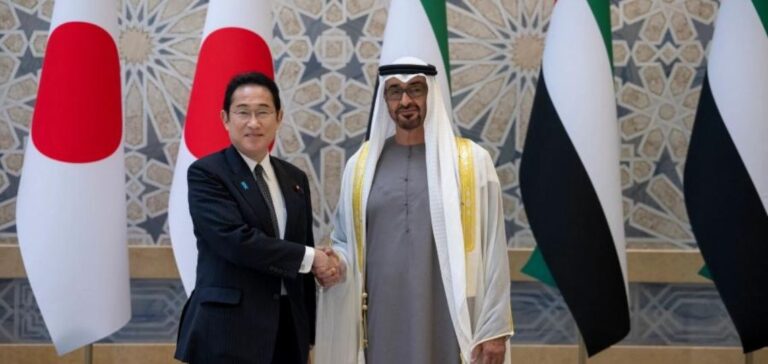Japanese Prime Minister Fumio Kishida visited the United Arab Emirates on Monday, the second leg of his Gulf tour focusing on energy cooperation in the run-up to the upcoming UN climate conference, COP28 in Dubai.
Japan signs renewable energy cooperation agreements with Gulf countries
Japan, which relies heavily on crude oil imports, counts Saudi Arabia, the Emirates and Qatar among its main suppliers. As Gulf countries turn to cleaner energy sources, particularly in the run-up to COP28 in November-December, Japan is keen to offer its green and renewable energy technologies to support their decarbonization efforts. Mr. Kishida was arriving from Saudi Arabia, where on Sunday he met Crown Prince Mohammed bin Salmane, the de facto ruler of the oil-rich kingdom. On Monday, he held talks in Abu Dhabi with Emirati President Mohammed ben Zayed, and will then travel to Qatar on Tuesday.
MESSRS. Kishida and ben Zayed “affirmed the commitment of both countries to strengthen cooperation on climate action, decarbonization efforts and clean energy” ahead of COP28, according to a joint statement released by the COP28 team.
The Japanese Prime Minister then met with COP28 President Sultan Al-Jaber, who also heads the Emirates’ oil company, ADNOC. In a text published by the Emirati news agency WAM, Mr. Kishida said he wanted to offer Japanese “advanced decarbonization technologies” as part of an “initiative” to cooperate with the Emirates “in the production and use of hydrogen, ammonia and carbon recycling”.
Tokyo and Abu Dhabi also signed 23 cooperation agreements, notably in the field of renewable energies, at a bilateral economic forum, according to WAM.
The day before, during Mr. Kishida’s visit to Jeddah, Saudi Arabia, the two countries announced the launch of an “initiative” to “support Saudi efforts to become a clean energy hub”, according to a joint statement.
According to state media, 26 cooperation agreements, notably in the fields of energy and green energy, were signed between the two countries. The six members of the Gulf Cooperation Council and Japan also announced on Sunday the resumption of free trade agreement (FTA) negotiations, which began in Tokyo in 2006 before being suspended in 2009.






















